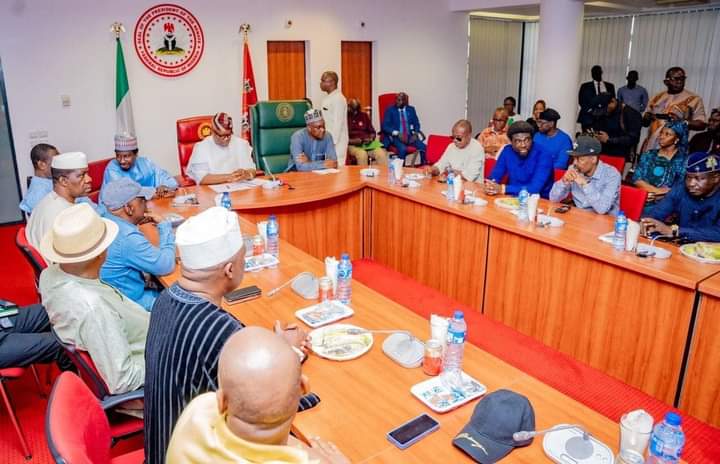The organised labour unions may agree to a ₦100,000 minimum wage as the Tripartite Committee on National Minimum Wage enters intense five-day negotiations to reach a consensus.
According to sources within the labour movement, union leaders are ready to revise their demand from ₦494,000 to ₦100,000, responding to widespread criticism of their initial proposal as being impractical and excessive.
The Minister of Information and National Orientation, Mohammed Idris, stated that the proposed minimum wage would incur an annual cost of ₦9.5tn, which he described as unsustainable for the country’s finances.
Despite the National Assembly’s leadership intervention, labour unions commenced an indefinite strike on Monday, severely impacting economic activities across the nation. This led the Federal Government to call an emergency meeting to resolve the situation.
In a move to advance negotiations, the unions suspended their strike for five days after President Bola Tinubu committed to a minimum wage higher than ₦60,000 and the tripartite committee agreed to daily meetings until a new wage is determined.
President Tinubu directed the Minister of Finance, Wale Edun, to present the cost implications of a new minimum wage within two days. This directive was issued during a meeting with the government negotiation team led by Secretary to the Government of the Federation, George Akume, at the Presidential Villa in Abuja.
A senior NLC official, speaking anonymously, confirmed that labour would push for a ₦100,000 minimum wage. He noted that Tuesday’s meeting primarily set the agenda for completing negotiations within the five-day window.
Prof. Theophilus Ndubuaku, Deputy Head of the NLC Political Commission, stated that the Tuesday meeting was to establish the agenda for the week-long daily meetings. He emphasized that the labour unions would reject any marginal increase above ₦60,000, aiming to finalize the wage at ₦100,000.
Festus Osifo, President of the Trade Union Congress, reiterated on Channels Television that labour would not accept minor additions to the current offer and called for a realistic wage reflecting current economic conditions.
Minister Mohammed Idris disclosed that President Tinubu had instructed the government representatives to collaborate with the private sector and state governments to achieve a new, affordable wage. He assured that the government would work diligently to finalize a new minimum wage within a week.
Following a six-hour meeting with the National Assembly, labour unions announced a one-week suspension of their strike to facilitate ongoing negotiations with the Federal Government on the minimum wage. The suspension aims to create a conducive environment for reaching an agreement.
The unions expressed their dissatisfaction with the government’s lack of action on reversing the electricity tariff hike and the discriminatory classification of electricity consumers, issues they insist must be addressed alongside the wage increase.
Opposition lawmakers in the House of Representatives have urged the Federal Government to implement a minimum wage of over ₦100,000 to meet labour’s demands. Several lawmakers proposed figures ranging from ₦90,000 to ₦150,000, citing the need for wages that reflect the current economic realities.
Senator Orji Kalu suggested a new minimum wage of ₦90,000 to resolve the standoff, emphasizing the importance of reaching an agreement to avoid further disruptions. Meanwhile, Senator Ahmad Lawan stressed the need to strengthen the naira’s value to ensure any wage increase has a meaningful impact.
Former CBN Deputy Governor Kingsley Moghalu recommended a minimum wage between ₦75,000 and ₦100,000, citing the current level of economic productivity and the need for sustainable wage policies.
Labour unions have “relaxed” their strike for one week, pending further negotiations, but remain poised to resume if a satisfactory agreement is not reached. The unions also highlighted the need for action on electricity tariffs and consumer classifications, essential for easing the financial burden on Nigerian workers and the general populace.
